Congratulations to the Winners of the Young Historians Essay Contest
We are pleased to announce the six winners of the 2020 American Ancestors Young Historians Essay Contest. The contest, which commemorates the 400th anniversary of the landing of the Mayflower, challenged Massachusetts students to reflect upon the relevance and legacy of the Pilgrims’ arrival in Plymouth Colony and the first interactions between the Wampanoag and English colonists. The winners' essays offer thoughtful perspectives on the topics of immigration, cultural assimilation, and personal identity.
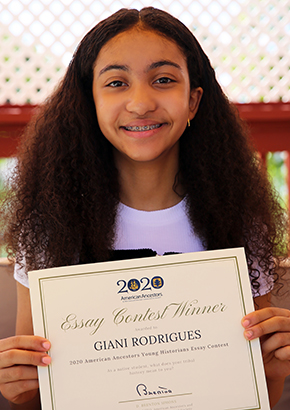
Giani Rodrigues
Boston Latin School, Hyde Park, MA
Winner, Grades 9-12: What does your tribal history mean to you?
"Although social injustice and inequality exist in our society, my support system is a constant reminder to embrace my tribal history. I would not want to come from any other ethnic group. When I am older, I want to be able to say, "My family fought for this," or "My family suffered through that, but we made it together through solidarity." We are proud to be Cape Verdean American, and we support each other no matter what." | Read More
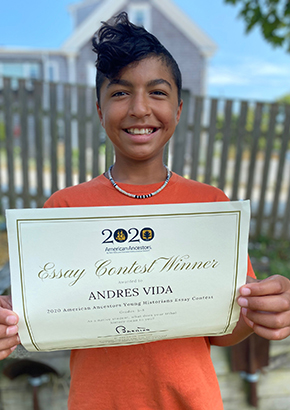
Andres Vida
Provincetown Schools, Provincetown, MA
Winner, Grades 5-8: What does your tribal history mean to you?
"I appreciate how the Canadian Blackfoot people don't give up and that they use the natural world for resources. Instead of cars, they use horses and donkeys. They don’t go grocery shopping. Instead, they go hunting for their food without wasting a bit of it. They are very thankful people and I am thankful for that, because when we eat, we just throw the bones away, but they make jewelry out of them." | Read More
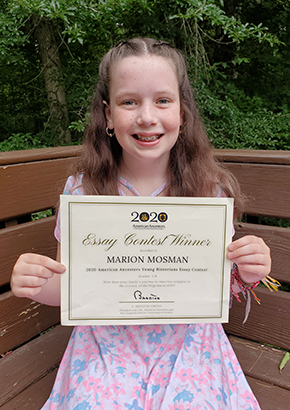
Marion Mosman
Mary Lyon K-8, Brighton, MA
Winner, Grades 5-8: How does your family’s journey to America compare to the journey of the Pilgrims in 1620?
"My family’s journey to America is similar to the journey of the pilgrims because they each came to America to make a better life for themselves and because they each became successful. I am very proud to have the middle name “Kelley” after my great-great grandparents. My middle name has a very strong meaning to me because my family worked very hard and overcame many challenges." | Read More
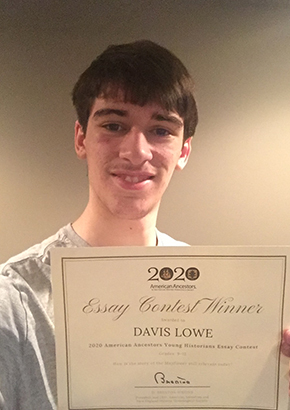
Davis Lowe
Georgetown Middle High School, Georgetown, MA
Winner, Grades 9-12: How is the story of the Mayflower still relevant today?
"Today, most refugees move to America because of wars in their own nation, such as those from Syria and Afghanistan. They had lived in areas where violence was common and brought it upon themselves to leave for a better life. They leave their homes with almost nothing. The Pilgrims did not leave a war torn place, or one with lots of violence...They left England because they wanted a society where everyone had the same religion that they did, which was a different form of Christianity than that of the Anglican church. While this cause may or may not be just, it is certainly a far cry from those immigrants who leave awful turmoil in hopes of a brighter future in America. To equate these two cases is not casting nearly enough light on the troubles refugees must face." | Read More
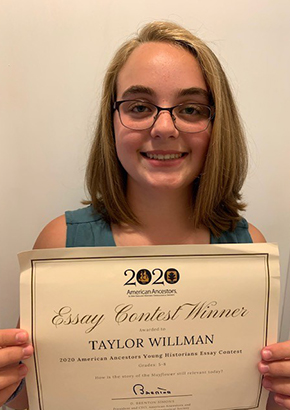
Taylor Willman
Mashpee Middle-High School, Mashpee, MA
Winner, Grades 5-8: How is the story of the Mayflower still relevant today?
"While immigrants have increasingly been treated with more respect and given more opportunities, there is still a stigma attached to them in certain social circles. What we can learn from these experiences is the repeated lack of opportunities provided to immigrants within our communities, as well as the similarities between today’s immigrants and those from the Mayflower. We can also use this knowledge in the future to ensure that other immigrants do not suffer the same injustices." | Read More
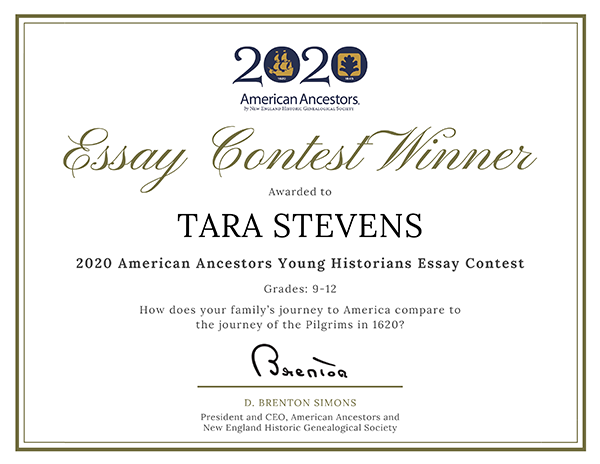
Tara Stevens
Georgetown Middle High School, Georgetown, MA
Winner, Grades 9-12: How does your family’s journey to America compare to the journey of the Pilgrims in 1620?
"The world as you know it is crumbling, and you can’t stay in your home country anymore and face persecution. These are the problems my family (Cambodian refugees) and the Pilgrims both faced. The journey of my family and the Pilgrims is eerily similar, but also dissimilar in certain ways. They were dissimilar when trying to leave their respective countries, similar in facing death and religious persecution, and similar in their initial struggles while settling in America. Not only do these stories eerily intertwine, but I am half white and half Asian, and I can trace my bloodline back to three people on the Mayflower as well as Cambodian refugees. This provides for an even eerier comparison." | Read More




